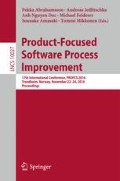Abstract
Organizations are increasingly adopting alternative organizational models to circumvent the challenges of traditional hierarchies. In these alternative models, organizations have leaders instead of the traditional boss and teams operate using self-management and peer-to-peer advice processes. Although the adoption of these models have primarily been seen in smaller companies and startups, examples of long-established organizations that have adopted these models to restructure themselves and move away from their traditionally slow hierarchies are starting to appear. In this paper, we explore how seven large software-intensive companies in the embedded systems domain are adopting principles of non-hierarchical organizations in order to increase empowerment. Based on our empirical findings, we provide recommendations for how to manage this transformation and we develop a model that outlines the steps that companies typically take when transforming from hierarchical towards empowered organizations.
Access this chapter
Tax calculation will be finalised at checkout
Purchases are for personal use only
References
Malone, T.W.: Modeling coordination in organizations and markets. Manage. Sci. 33(10), 1317–1332 (1987)
Laloux, F.: Reinventing organizations. Nelson Parker, Brussels (2014)
Larman, C., Vodde, B.: Practices for Scaling Lean & Agile Development: Large, Multisite, and Offshore Product Development with Large-Scale Scrum. Addison-Wesley, Upper Saddle River (2010)
Leffingwell, D.: Scaling Software Agility: Best Practices for Large Enterprises. Addison-Wesley, Upper Saddle River (2007)
Robertson, B.J.: Holacracy: The New Management System for a Rapidly Changing World. Henry Holt and Company, New York (2015)
Endenburg, G.: Sociocracy. The Organization of Decision-Making ‘No Objection’ as the Principle of Sociocracy. Eburon, Delft (1998)
Ismail, S., Malone, M.S., Van Guest, Y.: Exponential Organizations: Why New Organizations are Ten Times Better, Faster, and Cheaper than Yours (and What to Do About It). Diversion Books, New York (2014)
Mintzberg, H.: Structure in fives: a synthesis of the research on organisation design. Manage. Sci. 26(3), 322–341 (1980)
Mintzberg, H.: Designing Effective Organizations. Prentice-Hall, New Jersey (1983)
Eckstein, J.: Agile Software Development in the Large: Diving into the Deep. Dorset House, New York (2004)
http://smallbusiness.chron.com/structure-empowered-organization-44194.html. Accessed 23 June 2016
Highsmith, J., Cockburn, A.: Agile software development: the business of innovation. In: Software Management, pp. 120–122 (2001)
Yin, R.K.: Case study research. Design and Methods, 3rd edn. Sage, London (2003)
Maxwell, J.A.: Qualitative Research Design: An Interactive Approach, 2nd edn. SAGE Publications, Thousands Oaks (2005)
Adler, P.A., Adler, P.: Observational Techniques. In: Denzin, N.K., Lincoln, Y. (eds.) Handbook of Qualitative Research, pp. 377–393. Sage, Thousand Oaks (1994)
Ebert, C., Jones, C.: Embedded software: facts, figures, and future. Computer 42(4), 42–52 (2009)
Ries, E.: The Lean Startup: How Constant Innovation Creates Radically Successful Businesses. Penguin Group, London (2011)
Olsson, H.H., Alahyari, H., Bosch, J.: Climbing the “Stairway to Heaven”: a multiple-case study exploring barriers in the transition from agile development towards continuous deployment of software. In: Proceedings of the 38th Euromicro Conference on Software Engineering and Advanced Applications, Cesme, Izmir, Turkey, 5–7 September 2012
Author information
Authors and Affiliations
Corresponding author
Editor information
Editors and Affiliations
Rights and permissions
Copyright information
© 2016 Springer International Publishing AG
About this paper
Cite this paper
Olsson, H.H., Bosch, J. (2016). No More Bosses?. In: Abrahamsson, P., Jedlitschka, A., Nguyen Duc, A., Felderer, M., Amasaki, S., Mikkonen, T. (eds) Product-Focused Software Process Improvement. PROFES 2016. Lecture Notes in Computer Science(), vol 10027. Springer, Cham. https://doi.org/10.1007/978-3-319-49094-6_6
Download citation
DOI: https://doi.org/10.1007/978-3-319-49094-6_6
Published:
Publisher Name: Springer, Cham
Print ISBN: 978-3-319-49093-9
Online ISBN: 978-3-319-49094-6
eBook Packages: Computer ScienceComputer Science (R0)

